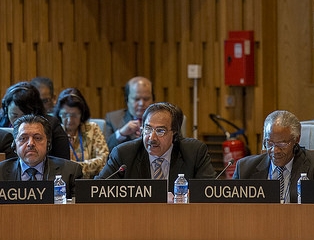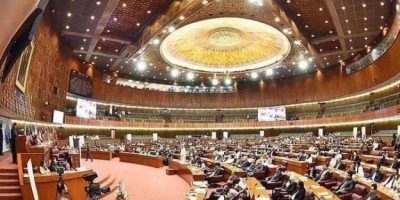Pakistan has embarked on a broad based programme for social sector development

PARIS, APR 27, (DNA) – Pakistan Government duly recognizes the importance of societal development and empowerment of people and has embarked on a broad based programme for social sector development.
This was stated by the Mr. Haseeb Athar Secretary, Ministry of Education Pakistan in his country statement at the 201st Session of the UNESCO Executive Board held in Paris, France.
The session was presided over by the Ambassador Michael Worbs from Germany and was also attended by Madam Irina Bokova Director-General of UNESCO, Ambassador of Pakistan to France and Permanent Delegate of Pakistan to UNESCO Moin ul Haque and other fifty eight Executive Board members.
Mr. Athar Haseeb said that Pakistan attaches high importance to education especially the girls education as Pakistan believe that education is an enabler for peace and development, helps in reduction of poverty and inequalities, address extremist tendencies and thus lead to better, peaceful, sustainable and inclusive societies.
Secretary Education said that government of Pakistan encourages the women to play their due role in development, prosperity and progress of the country and in this regard a number of legislative, financial and administrative measures have been taken to raise awareness among women about their rights, and participation and protection in public life.
Secretary also reposed Pakistan’s full support to UNECSO and hoped that UNESCO will continue to serve as a house of global peace, constructive debate and meaningful cooperation. Pakistan believed that UNESCO’s mandate and role of fostering peace and promoting inter-cultural understanding is still important and relevant today.
The Secretary assured the UNESCO Board that Pakistan would continue to work together with the global community in striving for an equitable, just, tolerant, open and socially inclusive world to make it a better place for our future generations.
Related News

PM invites lawmakers, party chiefs for in-camera briefing on regional conflict
ISLAMABAD, MAR 3: Prime Minister Shahbaz Sharif has invited parliamentary leaders and heads of politicalRead More

Türkiye, Pakistan join forces for Middle East peace
ISLAMABAD, MAR 3 /DNA/ – In a high-stakes telephone conversation tonight, Prime Minister Shehbaz SharifRead More


Comments are Closed